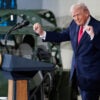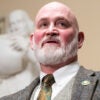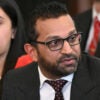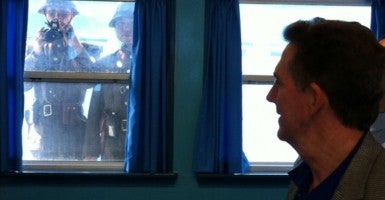The other day, I came face-to-face with communism and was unimpressed.
At the heart of the longest continuing cease-fire in American history, the divisions between North and South Korea are stark. One building—used for the occasional negotiation—is situated so that the border actually bisects a conference table in the middle of the room.
As I toured the Joint Security Area along the Demilitarized Zone, I was acutely aware of the armed guards on the other side of the border. They seemed acutely aware of me as well. The picture shows what happens when you don’t draw the curtains, and your neighbor is a mad dictator.
Before this trip, I had plenty of academic knowledge about communist regimes, drawn from histories, testimony, books, and news reports. But it is one thing to know that North Korea is controlled by a reckless tyrant and a danger to both its neighbors and the global community. It is another to come face-to-face with this particular brand of evil in the real world.
It struck me that these soldiers are not really on the outside looking in. Rather, they are trapped on the inside looking out.
They may be ordered to take pictures of foreign visitors touring the DMZ, but they dare not turn the camera upon their own leaders. Their fellow citizens cannot record the excess and injustice of the regime—or even the most mundane facts about their day-to-day lives.
In a nation forbidden from self-examination, there is no free press. There is an old camera stuck through the window to inform Kim Jong-un about what the neighbors are doing.
And in that moment, the fearsome vanguard of a movement which has murdered 100 million people and enslaved countless others looked small and pathetic.
It made me all the more grateful for the liberties we enjoy here at home every day. Sixty years ago, 36,500 Americans gave their lives so that South Korea could be free and communism contained. Today, 28,500 young Americans in uniform are still deployed in South Korea, some on freedom’s very frontier near the DMZ. We can’t forget the sacrifices these brave soldiers make, being stationed so far from their homes and families. They, and all our armed forces, continue to protect our First Amendment right to an unbound fourth estate.
It is to exercise this right—to communicate freely and directly with the American people–that The Heritage Foundation has created The Daily Signal.
The Daily Signal will hold its “camera” to our nation, its current events, culture, people and politics. It will show the world as it is, not as conservatives or liberals or libertarians—or even communists—wish it to be.
We are fortunate to live in a country where robust political discussion is encouraged. And as a nation, we can set the right priorities, place trust in the right leaders, and make the right choices only if we have access to dependable journalism and incisive policy analysis.
I know there are many Americans, with all manner of political beliefs, who would agree. I invite them to come to The Daily Signal to see what we’re covering, join the debate, and share their ideas.
































One Reply to “A Trip to the DMZ and My Face-to-Face Encounter With Communism”